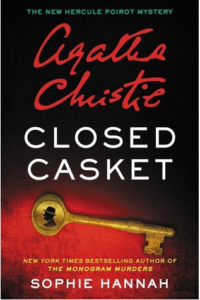Given how prominently the name Agatha Christie is displayed on the cover, I wonder why they don’t just call this Agatha Christie’s… oh actually, I can see why now, nvm.
 But yes, this is the second novel in Sophie Hannah’s take on the beloved Belgian detective, and I found I liked it less than the two other books in this series that I’ve read. And that’s less, I think, a function of plotting than of pacing and, at least in one significant instance, characterization.
But yes, this is the second novel in Sophie Hannah’s take on the beloved Belgian detective, and I found I liked it less than the two other books in this series that I’ve read. And that’s less, I think, a function of plotting than of pacing and, at least in one significant instance, characterization.
So our narrator Inspector Edward Catchpool is invited to stay at the Irish estate of Lady Athelina Playford, famed author of children’s detective novels. He’s a bit abashed to realize that Hercule Poirot has been extended the same invitation, as he’s still smarting at the battering his own reputation has taken from association with the Belgian detective. Poirot seems oblivious, but any petty considerations are swept aside when Lady Playford makes a shocking announcement at dinner. She declares that she’s changed her will, leaving her considerable estate to her sickly secretary Joseph Scotcher instead of to her adult children. Her taxidermy-obsessed son Harry seems to find the news only mildly discomfiting despite his wife Dorro’s bitter protests. The reactions of her archly contrary daughter Claudia and Claudia’s doctor fiance Randall Kimpton range somewhere between Harry and Dorro’s, but perhaps most surprising is Joseph’s response. After first demurring, he quickly proposes to his live-in nurse, also named Sophie (why do authors do this? Is it not weird to name characters after yourself, especially when they play crucial roles in the narrative?) Anyway, Sophie claims she needs time to think about it.
The house party is rounded out by Lady Playford’s lawyers and a trio of house staff equal parts surly and ridiculous. Almost everyone is more emotionally invested in Lady Playford’s decision than they’d like to let on, so it’s almost inevitable when someone is murdered as a result. But that’s partly why Lady Playford has Catchpool and Poirot on hand, in case the very worst happens, tho she’d quite thought the murder would go in another direction. Then again, Lady Playford certainly isn’t anywhere near as clever as she believes.
I do love me a manor house mystery, and while the plotting was decent, with lots of twists and red herrings, I thought the pacing rather off. At no point did I feel any narrative tension or suspense as the story barreled along. Towards the end, any appreciation I might have had for the plotting was likely subsumed by my growing dislike for Lady Playford and her ridiculous insistence on being conned. I likely wouldn’t have cared so much if not for Ariadne Oliver, the whip smart novelist and occasional author stand-in of Dame Christie’s own works. I dunno, I just don’t expect a mystery writer to be so run down in a Christie-related work. I kept wanting to yell at her, “Sometimes an asshole is just an asshole!” Plus my favorite character turned out to be the killer, which seemed a waste of good characterization.
While Closed Casket was undoubtedly more clever than its predecessor, The Monogram Murders, it felt less substantive, and I certainly feel less compelled to go seek out more in the series. I wouldn’t say no if one crossed my desk, but it’s certainly not high on my list of priorities any longer.
Closed Casket by Sophie Hannah was first published September 6th 2016 by William Morrow and is available from all good booksellers, including
Want it now? For the Kindle version, click here.
